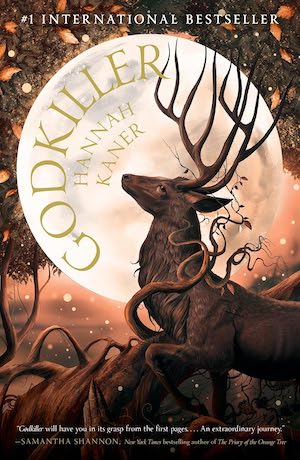Godkiller is Hannah Kaner’s debut novel. First published in the UK in January 2023, it received strong praise (including from Samantha Shannon and Tasha Suri) and rapidly became a UK bestseller. Despite my initial misgivings, I can see why. Blood and demons and strained loyalties and families found and chosen, the aftermath of civil war and the consequences of past decisions coming back around again: Godkiller takes the fabric of epic fantasy and stitches it into a clean, tense, precisely measured and neatly designed tapestry.
In Godkiller, gods are common, arising at every crossroads, demanding sacrifice and worship. Some are new, some have hardly any power at all, and some are both ancient and powerful. This ecology of divinity has given rise to a profession specialising in getting rid of gods that people want not to have to deal with: the veiga, or godkillers.
In the country of Middren, several years after a violent and desperate civil war, gods are forbidden. King Arren fought the gods that turned on his mother in the god-ridden city of Blenraden, and then he turned on the gods that had aided him, too. Kissen is one of the godkillers who hunt the countryside of Middren, wandering mercenary specialists that no one really wants to hire but that people can’t really do without. As a child, she saw her whole family murdered for a fire god’s whim, losing one of her legs in the inferno that claimed their lives, and rejected the boon of an ocean god that her father bought her with his life. After surviving what was left of her (harsh) childhood in Blenraden with its wild multitude of careless gods, she despises most divinities and finds satisfaction in destroying them.
Buy the Book


Godkiller
But then she encounters a god whose existence is bound to twelve-year-old Inara Craier, the sheltered and isolated daughter of one of Middren’s noble houses. Inara has never been allowed to leave her mother’s rural estate, where for five years she’s lived with the small god Skedi as her companion. Skedi is a little god of white lies, with hardly any power, but his life is connected to Inara’s: to kill Skedi might kill Inara, too, and neither of them can separate very far. But when Inara sneaks out to find someone who could, maybe, help her and Skedi live separate lives, she finds Kissen. And when Kissen attempts to return Inara to her mother, they discover the estate burning, all its inhabitants dead, killed by mercenaries. Inara has nowhere else to turn, and Kissen, once a young adolescent who had lost her whole family, can’t quite bring herself to abandon her. When Inara refuses to be left in relative safety with the two women who form the rest of Kissen’s chosen family, Kissen reluctantly agrees to take her to ruined Blenraden, to beg the remaining wild gods for aid.
On this forbidden pilgrimage—for in a land where gods are outlawed, pilgrimage is illegal—they encounter the former knight-commander Elogast. Elo has been a baker for three years, trying to put the war that haunts his memories out of his mind. Arren was once his childhood friend, but they disagreed when Arren turned on the gods that had helped them. But despite their disagreements, Elo’s loyalty remains with his friend the king, and Arren has been dying slowly since the last battle of the civil war, when a god kept him alive and (suspiciously, to the reader alert for the potential dramatic catch) didn’t ask for anything then in return. When Arren asks Elo to go to Blenraden to find him a better solution, or a cure, from one of the gods who he has outlawed, Elo goes despite his misgivings.
On the pilgrim road, among other pilgrims, they each have their secrets. But with demon-like constructs in pursuit of at least one of them, keeping their secrets from each other turns out to be the least of their problems, especially when circumstances separate them from the other pilgrims—the real pilgrims—of their small travelling group. They have to figure out if they can afford to trust each other: a hard choice, when one of them is a godkiller, one of them’s a god, and one is a former knight who might be expected to look askance at either. Add to that Inara discovering that she has very unusual powers all of her own, intimations of civil war in Middren, and and the tension can only rise.
In Blenraden, Inara and Skedi must face what their connection means for each other, Elogast must face the truth of his king’s choices, and Kissen is brought face-to-face with the god whose flames killed her family. (King Arren has been making some poor choices, including trying to become a god himself, and setting Elogast up to sacrifice himself in order to do it. That’s not being a good friend, Your Majesty. Or a good king.) Who can stand against a god?
A godkiller.
Maybe.
It’s a very vigorous, violent, and fraught climax, let’s just say. And recalls, satisfyingly and unexpectedly, elements from the prologue.
Godkiller offers us four points of view on the narrative: Kissen, Skedi, Inara, and Elo. Kissen and Skedi are the most interesting and distinct from the beginning: Kissen in her cynicism and hard-won bitterness at the shape of the world and of her life, and Skedi as a shape-changing god who’s figuring out both his nature and the boundaries of his relationship with Inara and is pushing at the limit of both, sometimes in inappropriate ways. Inara is perhaps least-well defined, but she’s a twelve-year-old who’s growing up fast: there’s room for her to grow into, and Kaner writes her adolescent protagonist with sympathy and appreciation for teenage strength of will. Elo, meanwhile, is trying very hard to be a Good Friend and a good man, while struggling with the memories of his wartime experiences: he blames himself for the king’s injury, and carries a lot of guilt for leaving Arren, laying down his sword, and becoming a baker, but he’s having a difficult time figuring out how to be the kind of person he wants to be.
Kaner draws her world in deft strokes, many of them broad but leaving space to be filled in later. It may benefit from more thorough detail on the political situation in the sequel (for Godkiller is the first in a series), but none of the characters are intimately involved in national politics here yet, and the world of towns and villages, wilderness and rivers, gods and shrines, is illuminated with enough detail to make it feel plausibly real. It is also, pleasantly, a world where queer relationships are normal.
This is a very strong debut, offering compelling characters whose problems mount from the ordinary to the epic in the space of the novel. I enjoyed it, and I’ll definitely be looking out for the sequel.
Godkiller is published by Harper Voyager.
Liz Bourke is a cranky queer person who reads books. She holds a Ph.D in Classics from Trinity College, Dublin. Her first book, Sleeping With Monsters, a collection of reviews and criticism, was published in 2017 by Aqueduct Press. It was a finalist for the 2018 Locus Awards and was nominated for a 2018 Hugo Award in Best Related Work. She was a finalist for the inaugural 2020 Ignyte Critic Award, and has also been a finalist for the BSFA nonfiction award. She lives in Ireland with an insomniac toddler, her wife, and their two very put-upon cats.











This review has me recalling earlier Jemisin work.